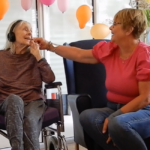Join Dementia Research updates
Keep up to date with the latest news and announcements from Join Dementia Research
Take a survey to help shape the future of dementia research
26 March 2025

Are you living with mild cognitive impairment or dementia, or supporting someone who is? Alzheimer’s Society and the UK Dementia Trials Network (UKDTN) are working together to improve access to dementia research opportunities across the UK. To ensure these efforts are effective, they are conducting a survey. This will help them understand how to improve […]
By taking part in research, you can help the future of treatments and care
10 March 2025

Thanks to people like you, research can take place to help improve care and find treatments for the future. Here are just some of the many people who are making a difference by taking part in dementia research. Former Police Community Support Officer (PCSO) Peter Middleton (pictured) has spoken about how volunteering for studies through […]
Research isn’t just looking at Alzheimer’s disease – other forms of dementia are important too
7 March 2025

When people hear the word ‘dementia,’ they often think of Alzheimer’s disease. But did you know there are different types of dementia, each with its own unique symptoms? Here we take a look at 3 lesser known types: frontotemporal dementia, Lewy body dementia and vascular dementia. Frontotemporal dementia Frontotemporal dementia (FTD) affects the front and […]
New classes of drugs have shown promise
6 March 2025

Dementia research is advancing at an incredible pace, bringing hope to millions affected by the condition. Currently, there are 127 drugs in development for Alzheimer’s disease. Globally, over 160 trials are testing more than 125 potential new treatments. With over 30 drugs now in Phase 3 trials (the final stage before regulatory approval) we are […]
Music can improve dementia symptoms
5 March 2025

Is there a song that instantly transports you back to a specific time in your life? A particular melody that stirs up emotions and memories long forgotten? Music has a profound ability to connect us to our past, and for those living with dementia, it can be a powerful tool for improving quality of life. […]
Research recognises the importance of carers’ wellbeing
4 March 2025

There are more than 700,000 people caring for friends and family members with dementia in the UK. Caring for someone with dementia can be challenging and rewarding. It can have profound impacts on relationships, priorities, and wellbeing. As we make new strides in dementia prevention, diagnosis, and treatment, it’s important that those developments go hand-in-hand […]
Lifestyle changes could reduce your risk of dementia
3 March 2025

Almost half of dementia cases can be prevented or delayed. Research has shown that our health in our 30s, 40s and 50s can have a particularly big effect on our dementia risk. However, simple lifestyle changes before the age of 30 can reduce the risk of developing the disease later in life. Risk factors for […]
Research is helping people with dementia live better lives
28 February 2025

Recent news on dementia research has focused on getting an early diagnosis and drugs to treat the condition. However, it is also important to find ways to help people live well with dementia. The IDEAL (Improving the experience of Dementia and Enhancing Active Life) project aimed to understand what factors influence a person’s ability to […]
We now know more about risk factors for dementia
27 February 2025

Research has helped us identify risk factors for dementia, which can in turn help us find ways to prevent the condition. Professor Paresh Malhotra, NIHR specialty lead for dementia, explains these risk factors in the video below: The English Longitudinal Study of Ageing (ELSA study) revealed that people who are overweight have an increased risk […]
Studies are helping to spot lesser-known symptoms earlier
26 February 2025

Research shows that poor spatial navigation can be an early sign of Alzheimer’s disease – long before symptoms such as memory problems arise. Another common symptom is feeling ‘lost’ even in familiar places. This is especially true of people aged 65 and over in the early stages of the disease. Studies are now using digital […]
